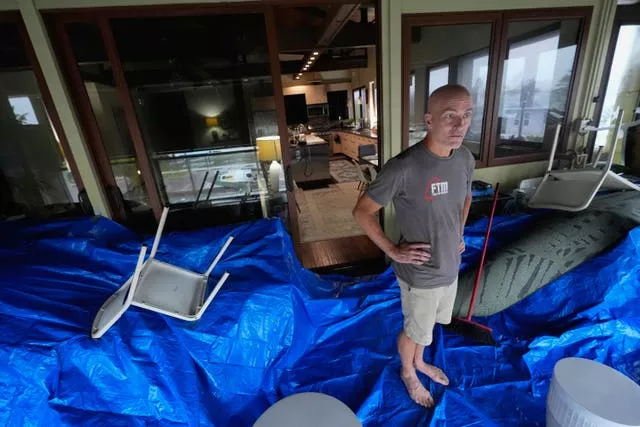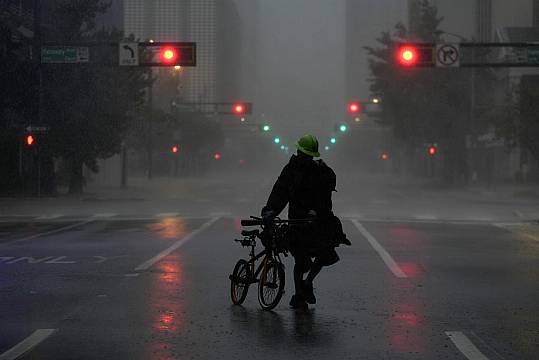Hurricane Milton brought misery to a coast still ravaged by Helene as it ploughed into Florida as a Category 3 storm, pounding cities with winds of over 100 mph (160 kph) after producing a barrage of 150 tornadoes.
The storm caused at least four deaths and compounded the misery wrought by Helene while sparing Tampa a direct hit.
It tracked to the south in the final hours and made landfall on Wednesday night in Siesta Key near Sarasota, about 70 miles (112 kilometres) south of Tampa.

The situation in the Tampa area was still a major emergency as St Petersburg recorded over 16 inches (41 centimetres) of rain, prompting the National Weather Service to warn of flash flooding there as well as other parts of western and central Florida.
Tropicana Field, the home of the Tampa Bay Rays baseball team in St Petersburg, appeared badly damaged.
The fabric that serves as the domed stadium’s roof was ripped to shreds by the fierce winds.

It was not immediately clear if there was damage inside. Multiple cranes were also toppled in the storm, the weather service said.
St Petersburg residents also could no longer get water from their household taps because a water main break led the city to shut down service.
The storm knocked out power across a large section of Florida, with more than three million homes and businesses without power as of early Thursday, according to poweroutage.us, which tracks utility reports.

Before Milton even made landfall, tornadoes were touching down across the state. The Spanish Lakes Country Club near Fort Pierce, on Florida’s Atlantic Coast, was hit particularly hard.
Homes were destroyed and four people were killed in tornadoes there, the St Lucie County Sheriff’s Office said.
About 125 homes were destroyed before the hurricane came ashore, many of them mobile homes in communities for senior citizens, said Kevin Guthrie, the director of the Florida Division of Emergency Management.
About 90 minutes after making landfall, Milton was downgraded to a Category 2 storm. By early Thursday, the hurricane was a Category 1 storm with maximum sustained winds of about 85 mph (135 kph) as it churned about 35 miles (55 kilometres) south of Orlando.
Heavy rains were also likely to cause flooding inland along rivers and lakes as Milton traverses the Florida Peninsula as a hurricane, eventually to emerge in the Atlantic Ocean on Thursday.
It is expected to impact the heavily populated Orlando area.

The storm slammed into a region still reeling two weeks after Hurricane Helene flooded streets and homes in western Florida and left at least 230 people dead across the South.
In many places along the coast, municipalities raced to collect and dispose of debris before Milton’s winds and storm surge could toss it around and compound any damage.
Officials had issued dire warnings to flee or face grim odds of survival.
“This is it, folks,” said Cathie Perkins, emergency management director in Pinellas County, which sits on the peninsula that forms Tampa Bay. “Those of you who were punched during Hurricane Helene, this is going to be a knockout. You need to get out, and you need to get out now.”
At a news conference in Tallahassee, Governor Ron DeSantis described deployment of a wide range of resources, including 9,000 National Guard members from Florida and other states; over 50,000 utility workers from as far as California; and highway patrol cars with sirens to escort gasoline tankers to replenish supplies so people could fill up their tanks before evacuating.
“Unfortunately, there will be fatalities. I don’t think there’s any way around that,” Mr DeSantis said.

Heavy rain and tornadoes lashed parts of southern Florida starting on Wednesday morning, with conditions deteriorating throughout the day.
Six to 12 inches (15 to 31 centimetres) of rain, with up to 18 inches (46 centimetres) in some places, was expected well inland, bringing the risk of catastrophic flooding.
One twister touched down on Wednesday morning in the lightly populated Everglades and crossed Interstate 75. Another apparent tornado touched down in Fort Myers, snapping tree limbs and tearing a gas station’s canopy to shreds.
Authorities issued mandatory evacuation orders across 15 Florida counties with a total population of about 7.2 million people. Officials warned that anyone staying behind must fend for themselves, because first responders were not expected to risk their lives attempting rescues at the height of the storm.
Florida governor Ron DeSantis said later on Thursday that Milton was a significant storm but not “the worst case scenario”.
He told reporters that the worst storm surge appeared to be in Sarasota County, where it was eight to 10 feet (2.5 to three metres) — less than in the worst place during Helene.
“We will better understand the extent of the damage as the day progresses,” he said. “The storm was significant but thankfully, this was not the worst case scenario.”
Water levels in many Florida rivers are forecast to continue rising, he said.







